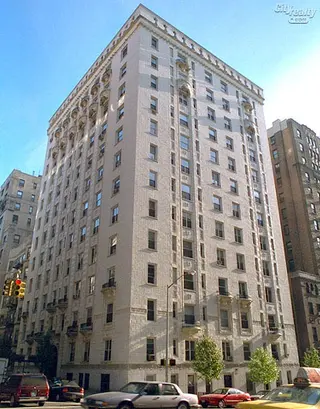 Carter Horsley
Carter HorsleyDec 23, 2011
Carter's Review
One of the city's loveliest apartment buildings and probably its most attractive and elegant white-brick building, this 13-story building was erected in 1912 and converted to a condominium in 1988.
It was designed by George and Edward Blum, architects who also designed 277, 610, 760, and 838 West End Avenue, 555, 791, 875, 940 and 1075 Park Avenue, 1435 Lexington Avenue, 676, 720 and 730 Riverside Drive, among many other Manhattan apartment buildings
In their fine book, "George & Edward Blum, Texture and Design in New York Apartment House Architecture," (The Friends of Terra Cotta Press, 1993), Andrew S. Dolkart and Susan Tunick note that this building was erected the same year as the Evanston at 610 West End Avenue that the Blums designed for George F. Johnson Jr., and Leopold Kahn. The Blums also designed the Admaston apartment building at 259 West 89th Street the same year for Johnson and Kahn. The Johnson-Kahn Company had previously built the Hendrick Hudson Apartments on Riverside Drive at 110th Street and the adjoining annex and the authors suggest that Edward Blum "may have been the designer" of these two major buildings for the architect of record, William L. Rouse.
"The Blums' apartment houses are part of a third wave of quality multiple dwelling construction, and their finest buildings stand out from the hundreds of more pedestrian examples that appeared in Manhattan....they were among the few apartment house architects of the period to show an appreciation for expressive exterior design."
"George and Edward Blum were among a large number of Americans to study at the ¿cole des Beaux-Arts. Most American students had little first-hand knowledge of Paris or of French language and culture and remained unaware of new design trends beyond those taught at the ¿cole. The Blums' French parentage and their experience growing up in France set them apart from most of their compatriots. It appears that they gained a greater familiarity with contemporary French architectural practice than most Americans, for their early buildings indicate a range of French influences far greater than those generally acquired through study at the ¿cole." "The manipulation of varied materials, especially the use of brick for decorative as well as functional purposes, exerted the most far-reaching influence on the Blums' apartment houses. Brick had been used extensively in French architecture, notably in the Midi region, near Toulouse and Albi, where stone is scarce, and on major buildings erected throughout France during the reign of Louis XIII in the early seventeenth century and during the nineteenth century. Although brick had not been a traditional building material in Paris, it became especially popular in the late nineteenth century for apartment buildings for the middle and working classes and for public buildings such as schools and baths," the authors continued.
This building has 61 apartments - 17 one-bedroom, 39 two-bedroom and 5 three-bedroom units - and is distinguished by its unusual, perforated roofline above its cornice and the pronounced verticality of its façade treatment that organizes most of the windows in piers.
The building, which has a one-story granite base, has considerable terracotta ornament and curved balconies on its top two floors and one of its lower floors.
The handsome sidestreet entrance leads to a lobby that has leaded-glass windows and a concierge. The building permits protruding air-conditioners.
One block from Riverside Park, this building is convenient to public transportation and neighborhood shopping.
Carter B. Horsley

- Condo built in 1912
- Converted in 1988
- 1 apartment currently for sale ($1.85M)
- Located in Riverside Dr./West End Ave.
- 61 total apartments 61 total apartments
- 10 recent sales ($950K to $2.7M)
- Doorman
 6sqft delivers the latest on real estate, architecture, and design, straight from New York City.
6sqft delivers the latest on real estate, architecture, and design, straight from New York City.
